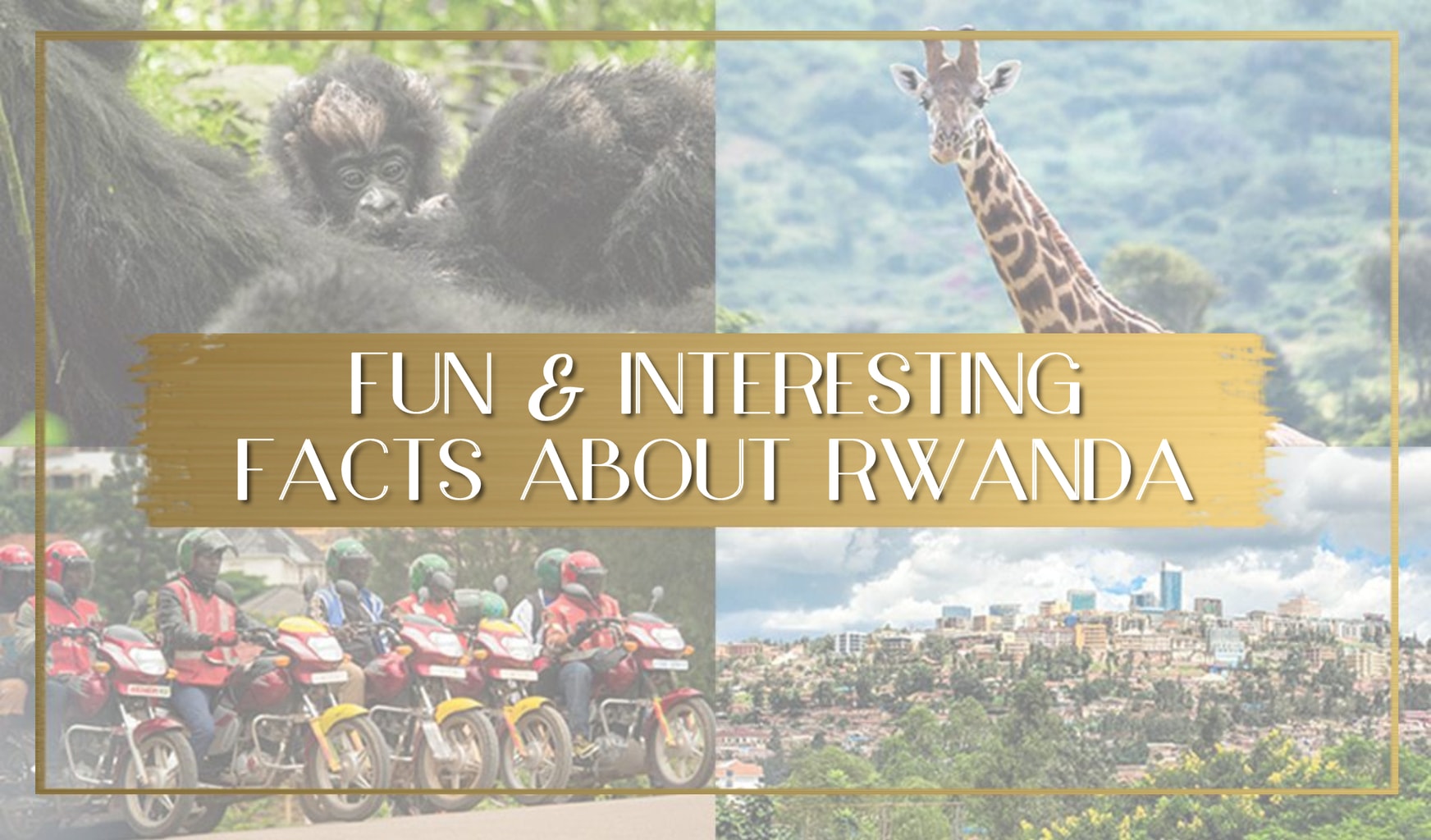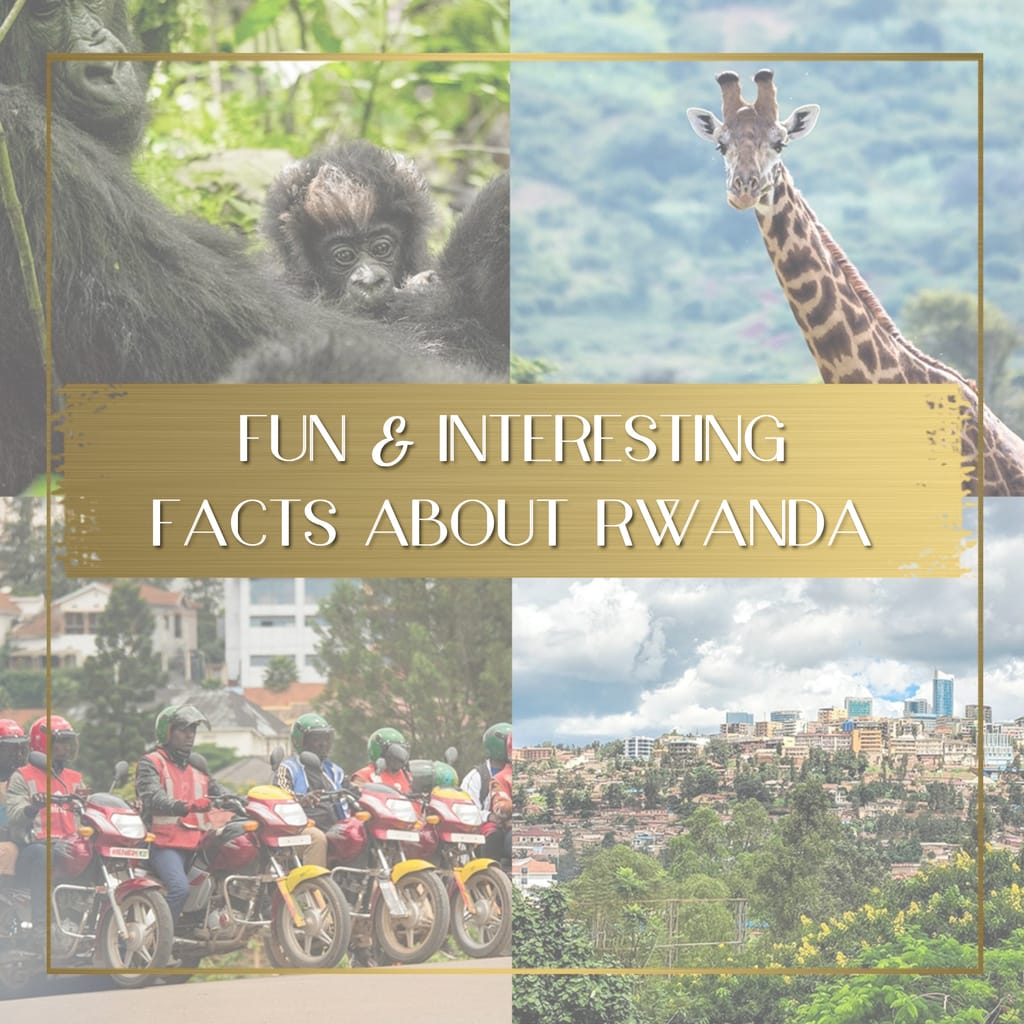
Rwanda, The Land of a Thousand Hills, is a country that is debunking myths about travel in Africa and making a big come back as a great destination for exclusive and intimate travel. I visited Rwanda on the completely wrong assumption that it would be similar to Uganda yet my facts about Rwanda could not have been more wrong.
Most people will only know two things about Rwanda: it has gorillas and there was a tragic genocide. There is so much more to the country. So much that you should not go uninformed, let me share some fun and interesting facts about this tiny landlocked country in East Africa.
1. Most number of mountain gorillas
The Virungas Massif, of which Volcanoes National Park is part of, has the highest population of mountain gorillas standing at 604 in 2016 after the latest census was released in 2018. This is 60% of the world’s population of endangered mountain gorillas in the wild. Of those, 12 families with around 150 gorillas are habituated to humans in Rwanda, that is, they can be visited by 96 tourists every day.
Gorillas in general are fascinating animals and you can read more about them in my in-depth article about gorilla facts, here or watch my video below. Above it all, their proximity to human DNA and the fact that we share over 97% of genetic code with them makes an encounter all the more magical.
2. But not just gorillas
Although most visitors will come to Rwanda exclusively to trek with mountain gorillas and this was historically the best and only tourist attraction in Rwanda this has changed a lot since the reintroduction of the Big Five in Akagera and the conservation efforts to protect the chimpanzees.
Rwanda today has a lot of tourism potential and there are more reasons to visit than just the mountain gorillas. You can easily spend a week or more and have a mix of forests, mountains, lakes, history, culture, hiking and wildlife. Here’s another video to get you inspired.
3. Plastic bags are banned
The government of Rwanda banned non biodegradable plastic bags in the country in 2008. This means that the heartbreaking pollution one sees across the continent is non-existent in Rwanda. The streets and roads are clean and devoid of any plastic.
When you arrive in Rwanda your bags will be searched and any plastic removed. It feels a bit as if you were trafficking in drugs, like Singapore with the chewing gum, but it works. Kigali is one the cleanest cities in Africa and the streets are tidy, with proper infrastructure, no potholes and no rubbish.
Watch France24’s short underground video about the plastic bag ban and the contraband that ensued, filmed in 2013, it is quite interesting and funny.
4. Easiness of doing business
Rwanda is one of the easiest countries to do business in and ranks second in Africa after Mauritius according to The World Bank. It is efficient, well-organised and has a similar corruption perception Score to Spain, and lower than Italy.
5. The highest % of women in parliament in the world
That is right, Rwanda has 64% of female parliament members, the highest in the world.
6. Umuganda
Every last Saturday of the month the entire country participates in Umuganda, or community projects. That is, everyone drops their job, their business and everything and participates in helping clean the roads, the streets, cut the grass, build schools, etc. for three hours from 8am to 11am.
This practice was instituted after the Genocide and has helped bring people together for the greater good of the country. It is amazing to see an entire country working together to keep everything clean and tidy and it says a lot about the culture and spirits of Rwandans today.
7. One of the highest population densities in the world
This would not be a highlight of any place or any articles on facts about Rwanda, but I thought it is important to mention because of the implications. As I traveled through the country I kept thinking, what makes Rwanda so different from the rest of the African countries I have visited?
It was a combination of the hilly landscapes, the great infrastructure and cleanliness but also the fact that we were permanently traveling by car across villages and towns. There were no expanses of nothingness, no emptiness in plains and savannas. In rwanda the fields are fertile and devoted to agriculture and the population is spread out across the country. Of the 12 million Rwandese, only 10% live in Kigali, the rest is divided among the hundreds of small villages.
When you visit Rwanda you are in touch with the local ways of life, with the culture, with the day to day comings and going of the locals. You see the farmers carrying their tools to the fields, the women carrying heavy loads of vegetables and fruits to the markets, the younger transporting branches and leaves at the back of their bikes, the milk jars being taken to the Milk Bars for pasteurisation. People watching has a whole new meaning in Rwanda and you can do it from the back of your car.
8. One of history’s most tragic and rapid genocides
We cannot talk about Rwanda’s facts without touching on the 1994 Genocide that filled the TV screens worldwide and shamed countless international governments for not intervening.
In just three months from April 1994 until mid-year, almost one million Tutsis and moderate Hutus were slaughtered by their fellow Hutu countrymen in what is probably the fastest genocide known.
The impact of the Genocide was brutal and it led to internal displacements and refugees fleeing into the DRC and Uganda. Recovering from that could not have been easy yet it is both humbling and hopeful to see a country coming together so strongly and so willingly back from such a terrible event to rebuild into one of the success stories in Africa both in terms of economic and social development.
A visit to the Kigali Genocide Memorial is key to understanding what you may have read online or in the news, if you are old enough. Nothing can put a face and a heart to the words you may read more clearly than seeing the pictures and the images of those who were affected. It is safe to say that every Rwandan was affected by the Genocide in a way or another.
Today, nobody identifies themselves with either the Tutsi or Hutu ethnicity and all call each other simply Rwandan. In fact, one of the most interesting facts about Rwanda and the Genocide, was realising that the racial differentiation was invented by the Belgian colonialists who decided to split the population among Twa, Hutu and Tutsi largely depending on class and wealth, rather than on any real ethnic heritage.
9. High value low impact tourism
Rwanda is a small country, it is densely populated and it had historically relied exclusively on gorilla tourism. In 2009, the country redefined its tourism policy and set a vision for 2020 aimed at diversifying the portfolio beyond gorilla trekking with a sustainably-focused tourism offer.
Given the small size of the country and the lack of possibilities for mass tourism, coupled with the country’s focus on sustainability and conservation, the country’s vision for 2020 wanted to bet for the higher end of the market.
Rwanda reintroduced the Big Five in Akagera National Park, created a conservancy in Gishwati Forest to bring back the chimpanzees and granted licenses for small and very high end lodges managed by luxury pioneering brands Singita, Wilderness Safaris and One&Only. Here is my review of the uber-luxe Bisate Lodge by Wilderness Safaris so you can get a taste of the high-end tourism approach.
In 2027, Rwanda also doubled the cost of a gorilla trekking permit from $750 to $1,500 making it two and a half times more expensive than the permit cost in Uganda. Today, 10% of the permit cost goes back to the communities that live in the area.
10. High above the sea
When I landed in Kigali, I remember noticing the airport sits above the city, on a hill, and that the city is basically made of many hills itself. What I did not realise at the time is that the country is 1,000m above sea level on average, reaching 4,500m at the top of Karisimbi and never really going down to sea level.
Most of the gorilla trekking happens at 2,500-3,000m above sea level, so the effect of altitude is felt straightaway and altitude sickness is a real risk. I felt the impact altitude can have on the body during a trip to Tibet which started in Lhasa, already at 3,600m above sea level, and ended at Everest Base Camp at 5,150m and did a lot of research on the effects of altitude and its causes. But I did not expect that Rwanda would be so high.
I had obviously not read about it enough because its location on the Albertine Rift and the volcanic makeup of the country would already be a good warning for its geography.
11. Several colonial powers
Although most people know that Rwanda used to be part of the Belgian Empire from WWI, most are unaware that before the Belgians, Rwanda was part of Germany which also controlled Tanzania.
12. Great infrastructure
I talked about how safe and clean Kigali is but that is not all. The roads are all impeccably clean and greatly maintained. There are no potholes and the bushes and trees along the road are manicured.
The public transportation is regulated. The buses work on a prepaid swipe card basis, like in Singapore, and they run on time. Moto taxis (boda bodas) wear helmets and have an extra one for their passengers. There are traffic lights and they are respected. There are no food stalls selling street food everywhere, all food sales are regulated and done in closed stores.
If you were expecting the chaos and disorganisation of any other country in Africa, you came to the wrong place. One of the most surprising facts about Rwanda is how well-run and organised it is.
